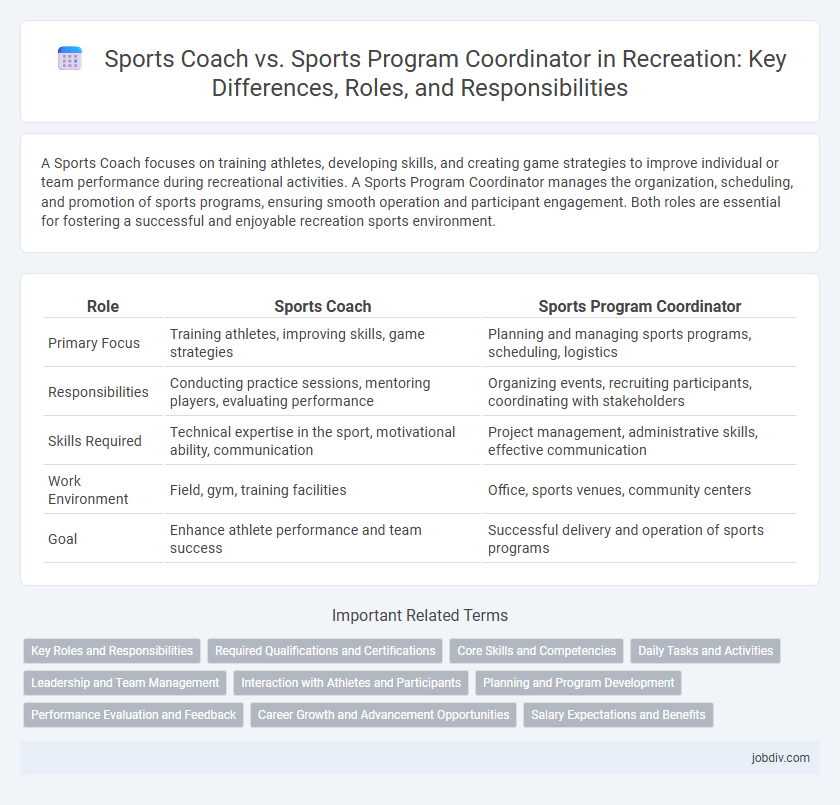A Sports Coach focuses on training athletes, developing skills, and creating game strategies to improve individual or team performance during recreational activities. A Sports Program Coordinator manages the organization, scheduling, and promotion of sports programs, ensuring smooth operation and participant engagement. Both roles are essential for fostering a successful and enjoyable recreation sports environment.
Table of Comparison
| Role | Sports Coach | Sports Program Coordinator |
|---|---|---|
| Primary Focus | Training athletes, improving skills, game strategies | Planning and managing sports programs, scheduling, logistics |
| Responsibilities | Conducting practice sessions, mentoring players, evaluating performance | Organizing events, recruiting participants, coordinating with stakeholders |
| Skills Required | Technical expertise in the sport, motivational ability, communication | Project management, administrative skills, effective communication |
| Work Environment | Field, gym, training facilities | Office, sports venues, community centers |
| Goal | Enhance athlete performance and team success | Successful delivery and operation of sports programs |
Key Roles and Responsibilities
A Sports Coach primarily focuses on training athletes, developing game strategies, and enhancing individual and team performance through targeted practice sessions. A Sports Program Coordinator manages the organization, scheduling, and overall administration of sports activities, ensuring compliance with regulations and facilitating communication between coaches, athletes, and stakeholders. Both roles are essential for successful sports operations, with the coach emphasizing athletic development and the coordinator focusing on program logistics and management.
Required Qualifications and Certifications
Sports coaches typically need certifications such as CPR/AED and sport-specific coaching licenses from organizations like the National Federation of State High School Associations (NFHS), while a degree in kinesiology, sports science, or physical education is often recommended. Sports program coordinators generally require a bachelor's degree in sports management, recreation, or a related field, with preferred certifications including Certified Park and Recreation Professional (CPRP) or Project Management Professional (PMP). Both roles benefit from strong leadership skills, but coordinators emphasize administrative experience and budgeting expertise.
Core Skills and Competencies
Sports coaches excel in skills such as athlete development, tactical strategy, and motivational communication, fostering individual and team performance. Sports program coordinators manage organizational competencies including program planning, resource allocation, and stakeholder collaboration to ensure effective sports delivery. Both roles require leadership and analytical abilities, with coaches emphasizing hands-on training and coordinators focusing on administrative execution.
Daily Tasks and Activities
Sports coaches develop training schedules, instruct athletes on techniques, and analyze performance data to enhance skills. Sports program coordinators manage event logistics, coordinate with teams and facilities, and oversee program budgets to ensure smooth operations. Both roles require strong communication skills, but coaches emphasize athlete development, while coordinators focus on administrative and organizational tasks.
Leadership and Team Management
Sports coaches demonstrate leadership through direct athlete training, motivation, and performance improvement, fostering team cohesion and individual skill development. Sports program coordinators manage multiple teams or programs, overseeing scheduling, resource allocation, and staff coordination to ensure smooth operations. Both roles require strong communication and organizational skills, but coaches focus more on hands-on leadership, while coordinators emphasize strategic team management.
Interaction with Athletes and Participants
Sports coaches directly engage with athletes, providing personalized training, feedback, and motivation to enhance individual and team performance. In contrast, sports program coordinators focus on organizing group activities, scheduling events, and managing resources to facilitate smooth participation for all athletes involved. Both roles require strong communication skills, but coaches emphasize one-on-one interactions while coordinators prioritize logistical support and participant engagement.
Planning and Program Development
Sports coaches specialize in designing training regimens and developing individual athlete skills to enhance performance during competitions. Sports program coordinators focus on organizing and managing multiple recreational activities, ensuring efficient scheduling, resource allocation, and community engagement. Effective planning for coaches emphasizes personalized development, whereas program coordinators prioritize strategic program expansion and participant experience.
Performance Evaluation and Feedback
Sports coaches primarily conduct real-time performance evaluation by observing athletes during training and competition, offering immediate, actionable feedback to improve skills and techniques. In contrast, sports program coordinators analyze broader performance metrics across teams or participants, using aggregated data to assess program effectiveness and inform strategic adjustments. Both roles utilize performance evaluation and feedback, but coaches focus on individual athletic development while coordinators emphasize overall program success and participant outcomes.
Career Growth and Advancement Opportunities
Sports coaches typically advance by gaining specialized certifications and achieving team successes that increase their visibility and demand in higher-level leagues or institutions. Sports program coordinators often progress through expanding their management skills, taking on larger or more complex programs, and moving into director or administrative roles within sports organizations. Both career paths benefit from networking within the sports industry and staying updated on the latest training and organizational strategies to enhance growth opportunities.
Salary Expectations and Benefits
Sports coaches typically earn an average salary ranging from $30,000 to $70,000 annually, depending on experience and level of competition, while sports program coordinators generally have higher earnings, ranging from $45,000 to $85,000 due to their broader managerial responsibilities. Coaches often receive benefits such as performance bonuses, travel allowances, and access to facility resources, whereas program coordinators enjoy comprehensive health insurance, retirement plans, and professional development opportunities. Salary expectations for both roles fluctuate by geographic location, organizational size, and the specific sports involved, making negotiation based on these factors crucial.
Sports Coach vs Sports Program Coordinator Infographic

 jobdiv.com
jobdiv.com